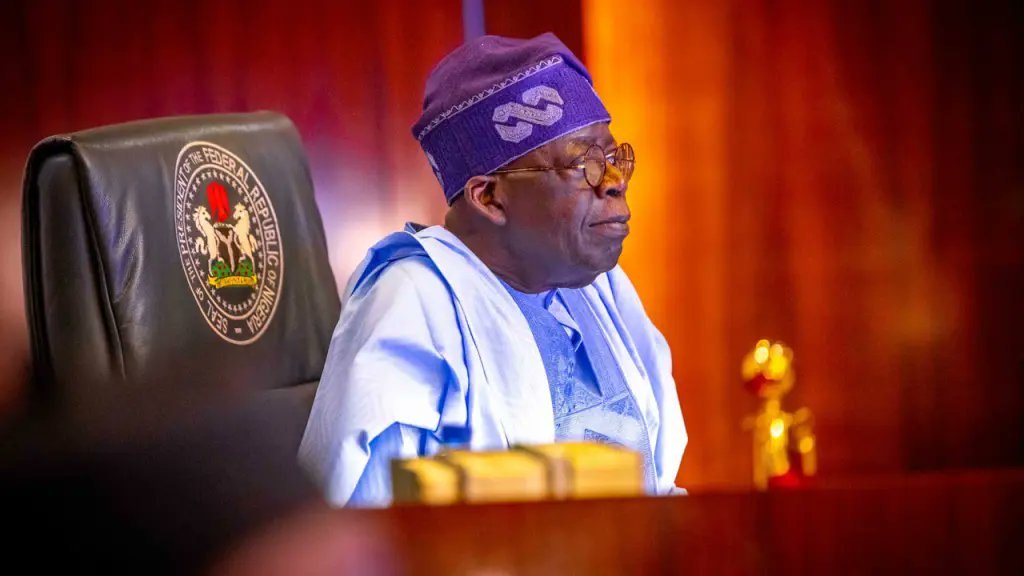President Bola Tinubu on Friday ordered sweeping changes to the leadership of Nigeria’s Armed Forces, aimed at strengthening the nation’s security architecture and consolidating command loyalty within the military.
The reshuffle, announced in a statement by Special Adviser on Media and Public Communication, Sunday Dare, comes amid heightened speculation of discontent within the ranks and renewed “coup scare” reports that have dominated public discourse in recent months.
Under the new appointments, General Olufemi Oluyede replaces General Christopher Musa as Chief of Defence Staff. Major-General W. Shaibu becomes the Chief of Army Staff, Air Vice Marshal S.K. Aneke takes over as Chief of Air Staff, while Rear Admiral I. Abbas assumes office as Chief of Naval Staff. The Chief of Defence Intelligence, Major-General E.A.P. Undiendeye, retains his position.
President Tinubu commended the outgoing Service Chiefs for their “patriotic service and dedicated leadership,” urging their successors to “justify the confidence reposed in them” and to uphold the professionalism, vigilance, and unity that define Nigeria’s Armed Forces.
The statement said, “All appointments take immediate effect.”
Although changes in military leadership are not unusual, the timing of this overhaul carries particular weight. It follows months of persistent rumours about alleged coup plots and unease over internal cohesion within the military, claims repeatedly dismissed by the Defence Headquarters (DHQ).
In February 2024, reports circulated that the Guards Brigade, the elite unit protecting the Presidency, had been placed on high alert over a supposed coup plot. But, the DHQ swiftly condemned the report as “malicious and unfounded,” while Minister of Information, Mohammed Idris, labelled it “unequivocally false” and a “desperate act of disinformation.”
More recently, in October 2025, another wave of rumours alleged that 16 senior officers were arrested for plotting to overthrow the government.
The DHQ again clarified that the matter was “purely disciplinary,” linked to internal breaches and promotion disputes, not an attempted coup.
Still, the frequency of such reports has heightened public anxiety and revived memories of Nigeria’s chequered history with military interventions.
Analysts say the recurring coup rumours reflect not so much an imminent threat of tanks rolling into Abuja, but a deeper unease within society, fuelled by economic hardship, insecurity, and eroding trust in institutions.
“The coup rumours are less about soldiers planning a takeover and more about the national mood,” a retired security official said on Friday. “They reveal how fragile public confidence has become, in governance, in the economy, and even in the stability of the state itself.”
Nigeria’s proximity to countries recently rocked by coups, including Mali, Niger, and Burkina Faso, adds a regional layer to the tension. Although the Nigerian military has consistently reaffirmed its loyalty to democratic rule, many analysts warn that the “coup contagion” across West Africa cannot be ignored.
Earlier this year, the DHQ reiterated its commitment to constitutional order, declaring: “The Armed Forces of Nigeria remain loyal to the Constitution and the President. We will continue to defend Nigeria’s unity and democratic order.”
Officials have blamed the fast-moving digital information ecosystem for fuelling misinformation. Many of the coup stories originate from anonymous social media accounts before spreading widely across platforms. In a climate of distrust, even unverified claims can gain traction, forcing government agencies into repeated denials.
For the Tinubu administration, the concern is not only about the veracity of the rumours but also their destabilising effect on public confidence and national cohesion.
As Minister Idris warned in February: “Fake reports of coups are as dangerous as coups themselves. They create fear, erode trust, and distract from governance.”
However, civil society groups argue that dismissing every rumour as fake news risks overlooking the systemic frustrations driving such narratives, from morale issues in the barracks to worsening economic pressures on citizens.
The African Democratic Congress (ADC), in a recent statement, cautioned the government against “weaponising” coup allegations to stifle dissent, urging instead that “national security must not become a pretext for shrinking democratic space.”
Observers say the repeated rumours underscore the fragility of confidence, both in the military and in the state.
For Tinubu, the reshuffle is not only administrative but symbolic: a recalibration of command and a reaffirmation of loyalty amid a climate of uncertainty.
“The real coup Nigeria must prevent is not one with guns, but one of public despair,” another retired officer said. “When people lose faith in the system, even rumours can shake the foundations of democracy.”
While there is no verified evidence of a coup attempt, the rumours remain a mirror reflecting the structural tensions between governance, military professionalism, and public perception.
How the Tinubu administration and the Armed Forces navigate this moment will determine the durability of Nigeria’s democratic stability in the years ahead.

